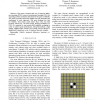28 search results - page 4 / 6 » Using heuristics to evaluate the playability of games |
119
click to vote
ESANN
2008
15 years 1 months ago
2008
In this paper the application of reinforcement learning to Tetris is investigated, particulary the idea of temporal difference learning is applied to estimate the state value funct...
122
Voted
CIG
2006
IEEE
15 years 5 months ago
2006
IEEE
Abstract— This paper compares the use of temporal difference learning (TDL) versus co-evolutionary learning (CEL) for acquiring position evaluation functions for the game of Othe...
124
click to vote
ATVA
2006
Springer
15 years 3 months ago
2006
Springer
Abstract. Model-checking alternating-time properties has recently attracted much interest in the verification of distributed protocols. While checking the validity of a specificati...
AAAI
2010
15 years 1 months ago
2010
The aim of General Game Playing (GGP) is to create intelligent agents that can automatically learn how to play many different games at an expert level without any human interventi...
98
Voted
AI
2002
Springer
14 years 11 months ago
2002
Springer
We describe a novel parallel randomized search algorithm for two-player games. The algorithm is a randomized version of Korf and Chickering's best-first search. Randomization...

